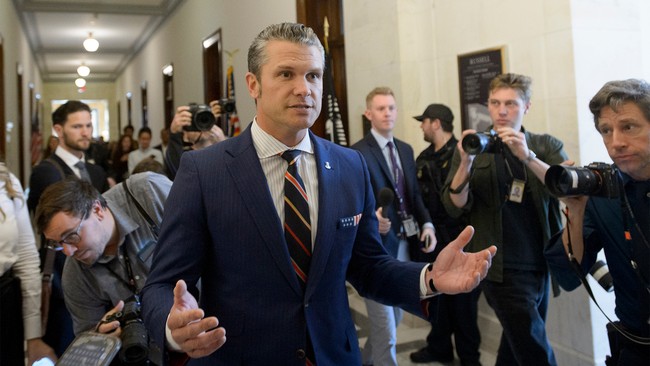
I’ve been closely following the debate over Pete Hegseth’s nomination to become the next Secretary of Defense. It’s unusual to see so much public interest in who might lead the Pentagon. Most Americans don’t spend much time thinking about who runs the military and couldn’t name a single member of the chain of command. So, why the heightened concern now?
Advertisement
The Secretary of Defense runs the largest agency in the world, the only one capable of exerting the kind of domineering power that only the U.S. military can. Indeed, the stakes for a role as consequential as defense secretary are particularly high, and any perceived character flaws or gaps in experience can carry significant weight. We should want the head of the military to be wise and above reproach. But in the current debate over who will replace Lloyd Austin in January, people seem to be running to their ideological corners.
The discussion over this nomination primarily reflects broader ideological divisions across the nation. American politics has become so polarized that leaders are often judged less on their merits and more on how closely they align with particular partisan camps. To some extent, this is part of the ongoing competition of domestic power across society. Presidents nominate cabinet secretaries not to be neutral, but to carry out their agenda across the executive branch of government. Thus, nominees inevitably face non-objective measuring, as the focus tends to aim more on political identity rather than on competence and vision. Nevertheless, the Senate is usually very deferential to the president, believing that he who wins that electoral contest earns the right to staff the administration unopposed. Yet the nomination for defense secretary is meeting the kind of drama one might expect from an early 2000s MTV reality show.
Advertisement
Critics have argued that Hegseth lacks the executive experience needed for the role. Yet, history shows that experience alone hasn’t guaranteed success for past defense secretaries. Generations of supposedly qualified leaders presided over one serious crisis after another. The fall of Kabul and the ongoing worst recruiting crisis in the history of the all-volunteer force occurred under experts, after all. Despite their qualifications, no recent secretary of defense has managed to discipline the Pentagon to pass its own internal audit. These systemic issues suggest that traditional experience, while important, isn’t the sole determinant of success.
NEW: Ernst Signals Hegseth Vote Following Second Meeting
The Pentagon’s DEI Mafia Has Set Their Sights on Saving Themselves From Pete Hegseth
Another line of criticism focuses on Hegseth’s personal life. To be sure, Hegseth wouldn’t meet the qualifications to serve as an elder or pastor in a church, and he has admitted to poor decisions in the past. But this raises a broader cultural question: When did Americans stop celebrating redemption stories? Today, Hegseth is happily married, active in his church, and a devoted father who embraces classical homeschooling. He served his country in combat and earned the respect and loyalty of those who worked with him in both military and civilian life.
Advertisement
Redemption is a deeply American ideal, but it often seems selectively applied. I recall reading about convicted bank robber Shon Hopwood, who, after release, earned a law degree and went on to teach at the Georgetown University Law Center—a story presented as an inspiring tale of growth and perseverance. But do the same people who applauded that story extend the same grace to Hegseth, a man who has overcome personal failings to achieve admirable success? If we value growth and change, shouldn’t we apply this principle consistently?
Evaluating someone’s past for predictions of future behavior is fair, but the recent past matters just as much as the distant past. People evolve. I’m not the same person in my 40s that I was in my 20s, and I suspect many others would say the same. Acknowledging this allows for a more nuanced understanding of a person’s capacity to grow and lead successfully.
Ultimately, the debate over Hegseth’s nomination reflects deeper societal tensions: between forgiveness and accountability, between ideological loyalty and open-mindedness, and between traditional and unconventional leadership. Whether or not one believes Hegseth to be the right person to serve as the next secretary of defense, this debate forces us to confront how we choose leaders and what values we prioritize in doing so.
Advertisement
As for me in this moment, I echo what Abraham Lincoln said of Ulysses S. Grant. “I can’t spare this man, he fights!” The bureaucrats had their turn. We would do well to have a warrior like Pete Hegseth leading the military as soon as possible.
Chase Spears served as a U.S. Army public affairs officer for 20 years, retiring as a Major (Promotable) in 2023. Among other pursuits, he enjoys writing about topics that include Civil-Military Relations, Leadership, and Policy. Chase holds a Ph.D. in leadership communication from Kansas State University, and today, he runs a leadership practice that helps people to turn brave ideas into action. You can find him on X/LinkedIn/Substack/YouTube @drchasespears.

